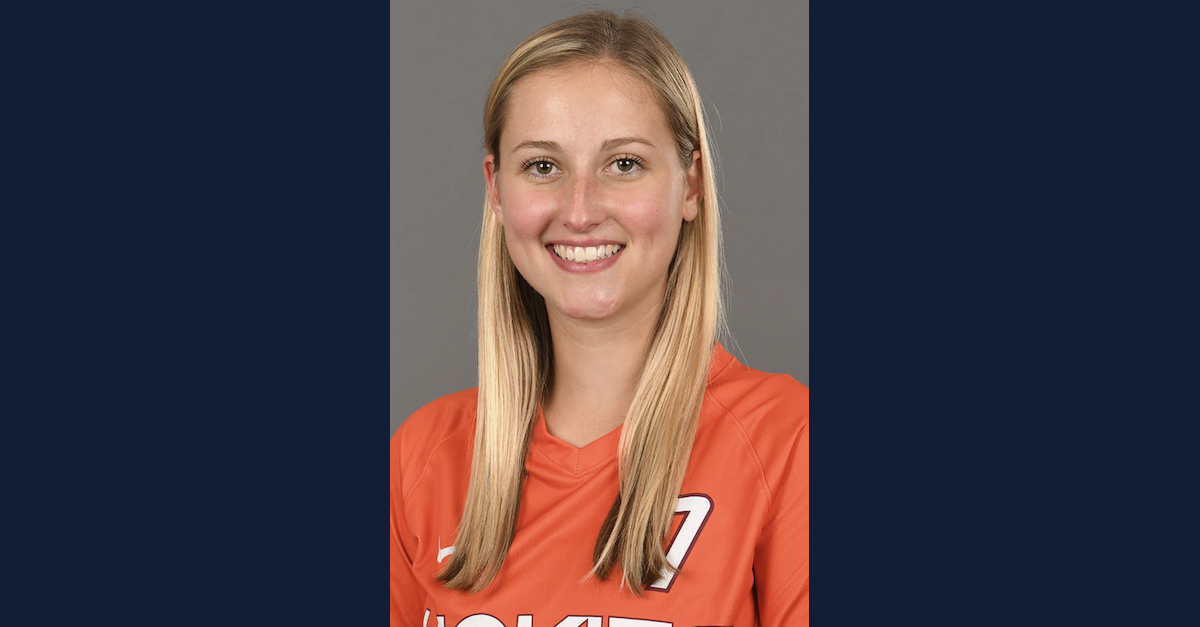
A former college soccer player scored a win in her First Amendment lawsuit against the Virginia Tech coach who benched her – in alleged reprisal for her refusal to support the Black Lives Matter-influenced kneeling gesture supported by most of her teammates in 2020.
A federal court recently ruled that the ex-player Kiersten Hening‘s claims against her one-time coach Charles “Chugger” Adair are worthy of being decided by a jury, declining a motion for summary judgment filed by the coach.
The case, from Hening’s perspective, stems from when she and two teammates declined to kneel during the Atlantic Coast Conference’s Unity Statement, which was read on stadium loudspeakers prior to the season opener against the University of Virginia in September 2020. The Hokies ultimately lost that game 3-1 to the Hoos.
Hening claims that her refusal to kneel resulted in Adair berating her during halftime and then complaining during a film session the next week that she was “bitching and moaning.” The former player also claims her then-coach severely limited her playing time as a result of her not kneeling.
“Hening, who had been a major on-field contributor for two years prior to the 2020 season, also asserts that Adair removed her from the starting lineup for the next two games and drastically reduced her playing time in those games because she had engaged in this protected First Amendment activity,” the opinion by Donald Trump-appointed U.S. District Judge Thomas Cullen explains. “As a result, Hening resigned from the team after the third game of the season.”
Adair counters that he was not aware of Hening’s decision to opt out of taking a knee until after the Virginia loss. The coach says his criticism of her during halftime and during film review was all about her poor play during the game.
The court’s ensuing analysis of those two positions sharply leans in the ex-player’s favor, finding that jurors could certainly find her version of events more plausible.
“Adair also contends that Hening’s theory of causation is, at bottom, based on rank speculation and self-serving conclusions,” Cullen writes. “But a fair review of the record indicates that Hening’s case is based on more than supposition; indeed, ample circumstantial evidence undergirds her claim and gives rise to genuine issues of material fact about Adair’s true motives and actions. The close temporal proximity between the pregame incident and Adair’s halftime tirade against his starting defender (approximately 45 minutes) suggests some causal connection between these two events.”
In a lengthy footnote, the court chastises Adair for claiming that he did not know about Hening’s desire not to kneel.
In her filings, Hening submitted a still photograph, culled from video footage of the game – that shows her coach kneeling and looking in her direction. Adair sought to have that photograph not introduced as evidence because Hening doesn’t actually appear in it. But, the court notes, there “is no requirement that the proponent of a photograph actually be in it” as long as other conditions are met.
“Since Hening was standing just outside the frame when the video from which these still images were taken was made, she has satisfied these foundational requirements,” Cullen writes. “And insofar as Hening will testify that she was standing just outside the frame on the left, and at least one of the photographs clearly depicts Adair, who is kneeling, looking in that direction, it has the tendency to make it more probable that Adair saw her standing.”
The court also says that Hening’s reduced playing time after the standing incident should be an issue for jurors to decide.
“The record establishes that Hening was a stalwart defender on the women’s team for two years prior to the 2020 season,” the opinion states. “She started nearly 40 games prior to the UVA game, including all but three as a freshman, and typically played most of the minutes of those games. But Adair benched her after the UVA game and drastically reduced her playing time. As a freshman, Hening averaged 76 minutes of playing time; as a sophomore, nearly 88. But during the Clemson game, Hening only played 29 minutes, and, at the UNC game, just 5.”
Hening still must persuade jurors that her account of events was correct.
“Ultimately, Adair may convince a jury that this coaching decision was based solely on Hening’s poor play during the UVA game, but the court, viewing the evidence in the light most favorable to Hening, cannot reach that conclusion as a matter of law,” Cullen wrote.
[image via Virginia Tech Athletics]